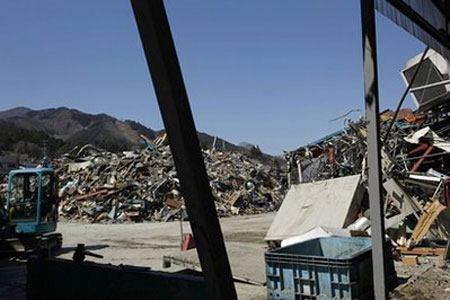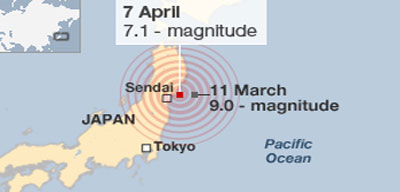Japan again shook because of the earthquake
A seismic strike of 7.1 on the Richter scale occurred in northeastern Japan last night causing officials to issue evacuation orders and issue tsunami warnings.
>>> Japan earthquake video

Rubble in the city of Ofunato, Iwate Prefecture, Japan after the March 11 earthquake.Photo: AP.
BBC quoted the announcement of the US Geological Department, saying that the magnitude 7.1 earthquake happened at 23h32 (21h32 Hanoi time). Its epicenter is 40 km from the coast, 118 km north of Fukushima province and 49 km from the Pacific bottom, close to the epicenter of the March 11 earthquake.
Workers are fixing incidents at the Fukushima I nuclear power plant unharmed from the new earthquake. They were evacuated.
Two people died and nearly 100 people were injured by the earthquake. Scientists say this is one of the aftershocks since the 9-magnitude Richter earthquake in early March. The aftershocks will last for years, even decades, the US news agency NPR quoted scientists predicting.
Toru Hanai, Reuters correspondent in Oshu, Iwate Prefecture, near the epicenter, said the hotel where he had lost power and the water pipe broke. " Everything fell. My room became a mess, losing a large area . "
In Tokyo, buildings also shook.
" The earthquake caused everything to shake in a rising and falling fashion. It started with slight vibrations, then grew bigger. We grabbed the bottles of water and hid under the table," said Miri Gono, a resident of Tokyo, tell.
Immediately after the earthquake, the Japan Meteorological Agency issued a tsunami warning on a coastline of 420 km long, but 90 minutes later they canceled the warning.

Earthquake epicenter near Sendai, where the tsunami was devastated.Graphic: BBC.
Meanwhile at the Fukushima I nuclear power plant, workers and engineers continue to pump nitrogen into the reactor to prevent the risk of hydrogen explosion. Previously they had succeeded in blocking the flow of radioactive leakage flowing into the external environment and the sea. This is considered a breakthrough in preventing radioactive substances from escaping.
After the earthquake yesterday, there is nothing unusual about the level of radiation around the Onagawa power plant, where fuel rods are being cooled with just a single source of electricity, the Japanese nuclear safety agency said.
Like Fukushima I, Onagawa and another Higashidori factory in Aomori Prefecture, Tokai No.2 in Ibaraki Prefecture, and Fukushima II have all been shut down since March 11.

The glass door of a house shattered due to a strong aftershock last night in the city of Sendai, Japan.Photo: AP.
There are no abnormalities in radiation levels around these plants after the new earthquake. But officials are still wary of the risk that these facilities may be damaged by aftershocks.
" Due to the earthquake (March 11), the risk of landslides or collapsing works is now higher than normal, the possibility of damage also increases with the aftershocks ", deputy chief of Japanese cabinet office Tetsuro Fukuyama said today.
- The earthquake shook in Tokyo
- Earthquake shook Japan
- Japan shook because of the earthquake
- The magnitude 6 earthquake shook Japan
- Strong earthquakes shook Tokyo
- Japan again shook because of the 6.1-magnitude earthquake
- Another 6.1 degree Ricter earthquake in Japan
- Japan has a strong earthquake again
- 30 earthquakes shook the island of Japan
- Strong earthquake in Japan, tram stops
- The 7.3-magnitude earthquake caused a small tsunami in Japan
- Tokyo shakes because of the earthquake
 Is the magnetic North Pole shift dangerous to humanity?
Is the magnetic North Pole shift dangerous to humanity? Washington legalizes the recycling of human bodies into fertilizer
Washington legalizes the recycling of human bodies into fertilizer Lightning stone - the mysterious guest
Lightning stone - the mysterious guest Stunned by the mysterious sunset, strange appearance
Stunned by the mysterious sunset, strange appearance Photos demonstrate the terrible devastation of the earthquake in Türkiye
Photos demonstrate the terrible devastation of the earthquake in Türkiye  Strange phenomenon before earthquake in Japan: Strange light crosses the sky, flock of birds creates rare scene
Strange phenomenon before earthquake in Japan: Strange light crosses the sky, flock of birds creates rare scene  Strange phenomenon before earthquake kills 118 people in China
Strange phenomenon before earthquake kills 118 people in China  The deadliest day in human history 500 years ago
The deadliest day in human history 500 years ago  A 3.5 magnitude earthquake occurred in Luc Yen, Yen Bai
A 3.5 magnitude earthquake occurred in Luc Yen, Yen Bai  Is the 6.6 magnitude earthquake in the Pacific Rim affecting Vietnam?
Is the 6.6 magnitude earthquake in the Pacific Rim affecting Vietnam? 